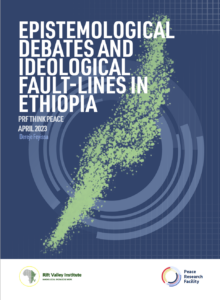INTRODUCTION
Social science knowledge production in Ethiopia, as elsewhere in Africa, has Eurocentric roots. This is because Ethiopian Studies was born outside of Ethiopia, with the first generation of scholars consisting mainly of academics from Western countries or Ethiopians educated in Eurocentric traditions. The knowledge they produced centred around Ethiopian exceptionalism, which was used to draw a distinction between the Ethiopian historical experience and that of the rest of the continent, especially sub-Saharan Africa. Beyond a fascination with the historical longevity of statehood in Ethiopia, including its ancient civilization and indigenous literacy, the concept was strategically deployed to excuse the European colonial defeat by a ‘black’ nation. This entailed a partial ‘whitening’ of Ethiopians, evident in use of the term ‘black Caucasians’. Such an approach cut Ethiopia off from the scholarship elsewhere on the continent, which ironically looked to the country as a symbol of African pride and source of inspiration for Pan-Africanism.
The Eurocentrism that arose from these early scholarly endeavours distorted—and continues to distort—how Ethiopians relate to each other, including in the political sphere. In particular, it has contributed to a domestic hierarchy in knowledge production, with greater focus placed on societies in the northern highlands where the Ethiopian state originated. These regions are mainly inhabited by the Tigrayans and Amharas—both predominantly followers of the Ethiopian Orthodox Church. Described as the so-called ‘Great Tradition’ (GT), the approach promoted by the Orthodox Church at best ignored those who belonged to the rest of Ethiopian society, and at worst depicted them in a negative light reminiscent of the colonial discourse of ‘people with history’ and those ‘without history’.
Originally Eurocentric, the GT was utilized in the nation-building project implemented under imperial rule and then, to an extent, by the Derg. The inequality in knowledge production and the politics of representation arising from the GT provoked discontent, leading to‘Counter Histories’ (CHs) advanced by ethno-nationalist movements. Paradoxically, the same Eurocentrism that generated the GT contributed to the emergence of the CHs, midwifed by the Marxism of the Ethiopian student movement and its application of socialist ideas and frames of thought to the Ethiopian context. This is most clearly expressed in the fact that the primary social question in Ethiopia was framed as ‘the question of nationalities’. While the GT places the stress on glory and national pride, the CHs spotlight the painful experiences of those relegated to the periphery during Ethiopia’s state formation.
As this report will demonstrate, a full understanding of Ethiopia’s recent and current polity is only possible if the impacts of the GT, the CHs and their contestations is taken into account. With this in mind, section 2 details past and current epistemological debates in Ethiopian Studies, including the initial predominance of the GT and the later rise of the CHs. Section 3 then charts how the two epistemic traditions have informed and been utilized by, respectively, the monarchy, the military (Derg) regime, the Ethiopian People’s Revolutionary Democratic Front (EPRDF)’s ethnic federalism, and the current Prosperity Party (PP). Finally, section 4 offers conclusions on how the GT and CHs are mutually constituted, and whether there is any prospect of the rival traditions coming together to build a common platform.
This think piece was written for the Ethiopia Peace Research Facility (PRF). The PRF is an independent facility combining timely analysis on peace and conflict from Ethiopian experts with support for conflict sensitive programming in the country. It is managed by the Rift Valley Institute and funded by the UK government.




